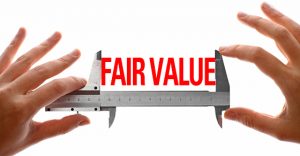Accounting & Audit Alert- Measuring fair value for financial reporting

Business assets are generally reported at the lower of cost or market value. Under this accounting principle, certain assets are reported at fair value, such as asset retirement obligations and derivatives.
Fair value also comes into play in M&A transactions. That is, if one company acquires another, the buyer must allocate the purchase price of the target company to its assets and liabilities. This allocation requires the valuation of identifiable intangible assets that weren’t on the target company’s balance sheet, such as brands, patents, customer lists and goodwill.
What is fair value?
Under U.S. Generally Accepted Accounting Principles (GAAP), fair value is “the price that would be received to sell an asset or paid to transfer a liability in an orderly transaction between market participants at the measurement date.” Though this term is similar to “fair market value,” which is defined in IRS Revenue Ruling 59-60, the terms aren’t synonymous.
The FASB chose the term “fair value” to prevent companies from applying IRS regulations or guidance and U.S. Tax Court precedent when valuing assets and liabilities for financial reporting purposes.
The FASB’s use of the term “market participants” refers to buyers and sellers in the item’s principal market. This market is entity specific and may vary among companies.
What goes into a fair value estimate?
When valuing an asset, there are three general valuation approaches: cost, income and market. For financial reporting purposes, fair value should first be based on quoted prices in active markets for identical assets and liabilities. When that information isn’t available, fair value should be based on observable market data, such as quoted prices for similar items in active markets.
In the absence of observable market data, fair value should be based on unobservable inputs. Examples include cash-flow projections prepared by management or other internal financial data.
While a CFO or controller can enlist the help of outside valuation specialists to estimate fair value, a company’s management is ultimately responsible for fair value estimates. So, it’s important to understand the assumptions, methods and models underlying a fair value estimate. Management also must implement adequate internal controls over fair value measurements, impairment charges and disclosures.
Valuation pros needed
Asset valuations are typically outside the comfort zone of in-house accounting personnel, so it pays to hire an outside specialist who will get it right. We can help you evaluate subjective inputs and methods, as well as recommend additional controls over the process to ensure that you’re meeting your financial reporting responsibilities.
Posted In: Alerts & Advisories




